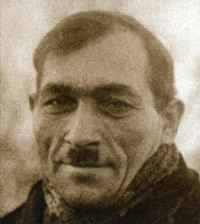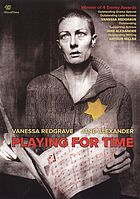The Murder of Cavalry Captain Witold Pilecki
Preface: Slav and Jew
The history of the Jews, since the Diaspora, had been almost 1900 years of mixed tolerance and persecution. A stateless people, desiring settlement, but necessarily adapted to the prospect of being driven from their homes, or extorted with the threat of same, formed an international network of mutual support and occasional refuge. Poland, where they found refuge from persecution throughout the Europe, was actually very receptive to their presence save for the buffeting times of the Reformation, Counter-Reformation and Inquisition - when the geopolitics of "religious cohesion", (Cuius religio, eius religio; Whose religion, his religion - i.e. the monarch determined the religion of the people) came intensely into play. With the onset of The Enlightenment, general tolerance and good will returned in Poland and the Polish territories outside of Russia. The opening of WW II saw 3 million Jews residing and often prosperous in Poland. To be sure there were Nazi collaborators in Poland, as in every country the Nazis overran. In the main, however, Polish response ranged from self-protective hunkered down separation to quiet, but dedicated support in harboring and transporting Jews to safer environs south and east of the German occupied territories - at great risk to those who helped and their families.
Unlike all other Nazi-occupied countries, if a concealed Jew was found hidden by a Polish family, the entire family, and often their neighbors as well, were executed right on the spot!
|
Some went further still, entering the death camps, smuggling out information and trying to liberate the prisoners there. Much of what we knew about the death camps came from the cooperation of Jews, Polish underground units and the Polish Government in Exile. Just as Polish underground agents were critical in securing and delivering an Ultra encrypter/decrypter to be reverse engineered by British Intelligence, these same assets provided photos and reports on the development and operation of the Nazi death camps. Clearly the people involved dearly wanted to end this atrocity.
However, a simple assault on the camps would be insufficient. The Nazi's had infantry, armor and air forces readily at hand. The underground only had infantry, and that organized to the necessities of guerilla war. Taking the death camps would be at best a stage one. Then would come provisioning and dispersing the prisoners.
Did you know? Polish citizens have the world's highest count of individuals awarded medals of Righteous among the Nations, given by the State of Israel to non-Jews who saved Jews from extermination during the Holocaust. There are 6,195 Polish men and women recognized as "Righteous" to this day, amounting to over 25 per cent of the total number of 22,765 honorary titles awarded already . |
These prisoners were already being slowly starved to death, the better to make them unable to resist. They would need ample food to restore their strength and days for that to take effect. At the end of stage 2, you would mostly have a re-nourished lightly armed mob. Still, as the story of Witold Pilecki shows, efforts were made to devise a plan of intervention.
At the end of the war, and with the rise of the Communists, the Holocaust - or Shoah, as it is sometimes called - proved a gift from the Nazis to the Communists, and especially the Soviets. Intimations by Polish Communists that Polish patriots were implicated in these atrocities were sallied to chill the voices of those who might speak in the defense of them, lest one find oneself speak up for an SS (Ger. Schutzstaffel, Protective Squadron) collaborator. Likewise, the Soviets could - through pervasive innuendo, libels and slanders - venture that their hegemony over the Eastern Bloc was a bulwark against renewed depredations against the Jews by indigenous populations predisposed towardsAnti-Semitism.
A Volunteer For Auschwitz - Witold Pilecki, Cavalry Captain (1901-1948)
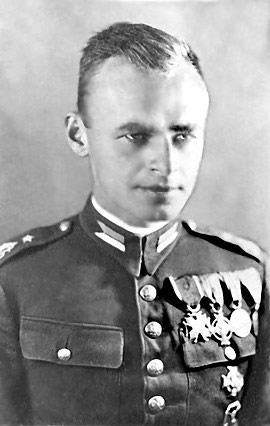 | |
"The Cavalry Captain, Pilecki, is one of our nation's foremost heroes, whom all military men ought to salute […] We are no better than the Germans and Russians, for by our own hands, we were capable of murdering our own heroes”.
Excerpt from the defense attorney's argument during Witold Pilecki's rehabilitation proceedings, before the Military Chamber, of the Supreme Court of the Republic of Poland, in 1990.
Witold Pilecki was murdered on May 25, 1948. He was executed by the communists, with a single shot to the back of the head.
Witold Pilecki, Captain (1901–1948)
[1] His daring plan to free those imprisoned at Auschwitz with the help of the Polish 1st Independent Parachute Brigade, never materialized. Fearing that his mission was about to be compromised, after spending 945 days in Auschwitz, he escaped in 1943. In 1944, Cpt. Pilecki fought in the Warsaw Uprising in the ranks of the “Chrobry II” Unit. In 1945, he was attached to the II Corp of the Polish Army In Italy. On orders from General Anders, he returned to the communist-occupied Poland, in order to re-establish the war-torn Polish intelligence infrastructure, which at that time was under command of thePolish-Government-In-Exile in London. [(2) Photo below: Witold Pilecki, prisoner number 4859, the Nazi concentration camp Auschwitz].
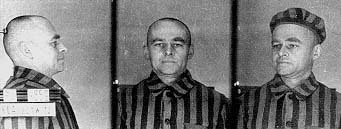 | | In May, 1947 Captain Pilecki was arrested by the Polish secret police (pol. UB - Urzad Bezpieczenstwa), and incarcerated at the Warsaw’s infamous jail at the Rakowiecka Street. Despite being subjected to the most horrifying tortures, until the end, he remained faithful to his military oath – “God, Honor, Country.” After listening to death sentence charges against him, he responded to the "court": |
“I tried to live my life in such fashion, so that in my last hour, I would rather be happy than fearful […] I found happiness within me, resulting from the realization, that this fight was worth it”.
The staged trial of the “Pilecki’s Group” took place from March 3 to March 15, 1948 before District Military Court in Warsaw, presided by the Chief Judge Lieutenant Colonel Jan Hryckowian (3), and the prosecutor, Major Czeslaw Lapinski. Captain Pilecki was accused of espionage on behalf of foreign power, and activities aiming at organizing armed underground, among other charges. The prosecutor asked for the death penalty, citing, that the accused committed the gravest of crimes - the “crime of treason against his nation”. A request for leniency sent by his wife Maria to Boleslaw Bierut, and Jozef Cyrankiewicz (a fellow-prisoner at the Auschwitz concentration camp, codenamed “Witold” ), was never answered. The death sentence was carried out on May 25, 1948 in the Mokotow’s prison. The body of Captain Pilecki was never returned to his family, and his burial place is unknown to this day. A symbolic grave was erected at the Ostrowa Mazowiecka cemetery.
A resourceful and creative manager, before World War II, Witold Pilecki not only successfully managed his family estate in Skurcze, but also organized local social assistance programs, established agricultural association (pol. kolko rolnicze), and civil defense courses. He also started a family, and cultivated many artistic interests including drawing, painting, and poetry.
"For years our family lived feeling profoundly wronged and ostracized, because not only was our father taken away from us, but also his good name and his memory were veiled in a poisonous shroud of accusations of treason. It burdened our hearts for a long time" - said Pilecki's son Andrzej.
| | 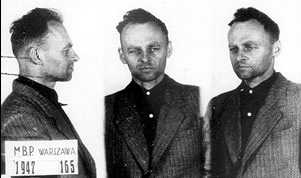 Photo of Captain Pilecki taken by Polish Secret Police -Urzad Bezpieczenstwa - the UB, in 1947] Photo of Captain Pilecki taken by Polish Secret Police -Urzad Bezpieczenstwa - the UB, in 1947] |
"It was very difficult to dilute this [poisoned] atmosphere, because the resistance from the communist institutions and number of individuals supporting them was very significant. Even during the III Republic [of Poland], the old regime did not allow overturn the 'court sanctioned murder' (pol. 'Zbrodnia Sadowa') committed against Cavalry Captain Pilecki and his comrades, perpetrated against them during the years of Bierut's reign. Only the anticommunist members of the democratic opposition cultivated the truth about Cavalry Captain Pilecki, and his heroism” - continued Andrzej Pilecki.
Until 1989, all information about accomplishments and fate of Witold Pilecki were subject to the strict censorship by the Polish People’s Republic (pol. abbrev. PRL). See Communist Propaganda Operations And "Anti-Semitism." The rehabilitation of Cavalry Captain Witold Pilecki was undertaken by the Military Chamber of the Supreme Court of the Republic of Poland, only on 1 October, 1990. In January 1993, the “court sanctioned murder” perpetrated on Witod Pilecki served as one of the three examples cited in an open letter sent by the veterans and historians from the “For Justice And Truth” (pol. “O sprawiedliwosc i prawde”), who demanded that the perpetrators of the Stalinist crimes who were still alive in Poland be brought to justice.
Communist secret police interrogators in the Witold Pilecki's case.
Witold Pilecki was interrogated and tortured by: Col. Jozef Rozanski, Lt. S. Lyszkowski, Lt. Krawczynski, 2nd Lt. J. Kroszel, Lt. Tadeusz Slowianek, 2nd Lt. Eugeniusz Chimczak, and Lt. Stefan Alaborski, all famed for their brutality and inhumane treatment of political prisoners. The horror of the interrogations lasted for over six months. Pilecki's interrogations were personally supervised by Colonel Roman Romkowski. The other prisoners incarcerated at the Rakowiecka Prison at the same time as Pilecki stated, that his entire body was black and blue as a result of endless beatings, and that all of his fingernails were torn off. Pilecki had told his wife that Auschwitz was child's play in comparison to the horror he had endured at the hands of his communists tormentors.
|
| Maria Hattowska, today an eighty-two year old member of the Polish Anti-Communist Underground who just like Pilecki was incarcerated on the trumped up charges of espionage in 1946, remembers the torture methods employed by Humer, Rozanski and others: |
| "I was lead to the interrogation room; eight men awaited there. Among them were Jozef Rozanski and Adam Humer. Rozanski started to beat me first. He kicked me [so hard]that I fell off the chair. When I got up he kicked me in my stomach, than again, and again […] When I was no longer able to stand on my own, two others were holding me up, and Rozanski kept on kicking me. [...] Humer was beating me with a riding whip. It had a metal bearing attached to the end which cut my skin. He was aiming at my kidneys. He was counting the blows. After the one-hundred-fiftieth blow, he asked the others to take over, because he got tired. I got another hundred fifty blows [after that]; they got scarred that [by beating me like this] I'll escape further interrogations [by dying]. They summoned a doctor. The agony [of dying] is pleasant, [because] one doesn't feel the pain any more. The doctor prepared an injection, but I was trying to twist and turn my arm in order not to allow him to inject me. I wanted to die, but I was powerless, and they managed to revive me. [...] I thought to myself, unfortunately I will live [...] Because of the kidney injuries [resulted from the beatings], to this day I suffer from high blood pressure [...] I never got married, because I didn't want to be a burden to anyone […] they were hitting me in the crotch area, and because of that, I could never have children." | | 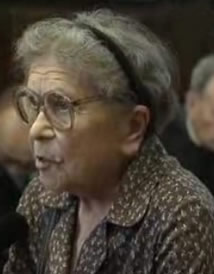 |
| Above: 2nd Lt. Maria Hattowska, Polish Home Army and WiN Soldier. Photo: TVP |
In his article entitled "Ciezka praca sledzia" re-published by the "Antysocialistyczne Mazowsze", Tadeusz M. Pluzanski, the son of Tadeusz Pluzanski, one of Pilecki's co-conspirators, poignantly notes that ironically, to this day many of Pilecki's tormentors such as Chimczak and Krawczynski, comfortably live on the same street in downtown Warsaw. With no exceptions, they all suffer from a "collective" amnesia when asked about their role in Pilecki's court-sanctioned murder.
Michael Schudrich, the Chief Rabbi of Poland said about Pilecki: “[he was] an example of inexplicable goodness at a time of inexplicable evil. There is ever-growing awareness of Poles helping Jews in the Holocaust, and how they paid with their lives, like Pilecki. We must honor these examples and follow them today in the parts of the world where there are horrors again.”
Witold Pilecki was executed on May 25, 1948 at 9:30 p.m. in the presence of the Deputy Prosecutor of the Supreme Military Prosecutor's Office of the Polish Army, Major S. Cypryszewski, Warden of the Mokotow Prison, Lieutenant Ryszard Monko, Lieutenant Kazimierz Jezierski, MD, a physician, and Capt. Wincenty M. Martusiewicz, Chaplain.
|
|
|




